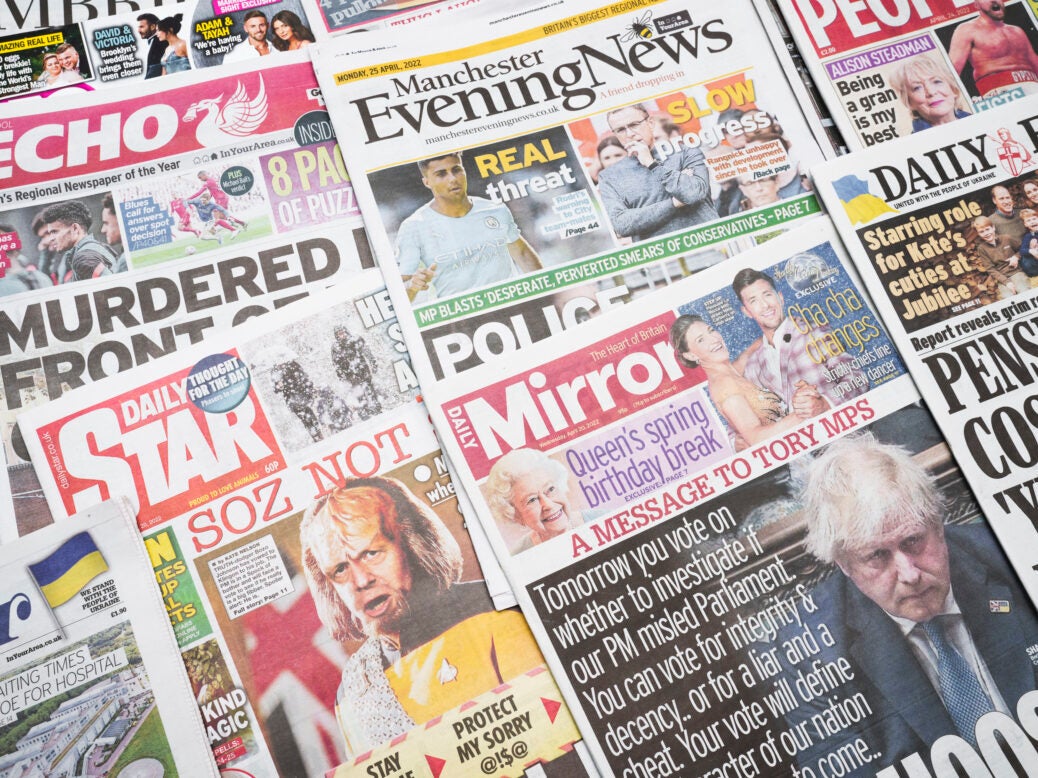
Full-year 2022 results for Reach, the UK’s largest newspaper group, reveal the full impact inflation and the cost of living crisis is having on consumer news media.
Revenue at Reach fell 2.3% to £601.4m in 2022, and operating profit fell 27.4% to £106.1m. The group publishes more than 200 regional and national news brands including: The Manchester Evening News, Liverpool Echo, Express titles, Mirror titles and Daily Star.
Digital revenue was marginally up 1% for the year, but fell 5.9% in the final quarter as the cost of living crisis began to bite.
Print revenue fell 3.5%, with print advertising down 15.9% in the year and cover price revenue down 1.7%.
Overall print accounted for £448.6m of Reach turnover for 2022 versus £149.8m for digital revenue.
The company was hit by a sharp price in the cost of newsprint which accounted for £75.4m of costs in 2022 versus £52.9m in 2021. This was largely driven by the rise in energy prices since the start of the war in Ukraine.
The cost of settling claims arising from the hacking scandal at the Mirror titles was £11m last year versus £29m in 2021. Some £14.8m was spent servicing the pension fund and £15.5m was spent on redundancies and other cost reduction measures.
According to Ipsos iris, Reach is the UK’s biggest news publisher with a monthly audience of around 39m in the UK. Overall page views were said to be up 4% in the year.
But the company reported a sharp drop in yield from programmatic ads sold on the open market – down 33% in the year.
This was however balanced with an increase in revenue from ads sold directly based on Reach’s first-party data insights. The company now has 12.6 million registered readers in the UK, of whom 5.6 million are said to have read an article in the last month.
In addition to gathering reader registrations, Reach collects behavioural data on unregistered readers via its in-house Mantis technology.
This enables it to target higher yield advertising based on information such as gender and location. These data-led ad revenues were said to be up 50% and now account for 30% of the total, versus 70% for programmatic ads sold on exchanges.
Reach said it plans to cut operating costs by between 5% and 6% this year meaning more redundancies are expected. In January the company began a round of 200 proposed job cuts.
It also said it was trialling an ad-light paid-for experience on mobile.
Chief executive Jim Mullen said: “Reach is continuing to deliver our Customer Value Strategy and is becoming a fundamentally different business; more efficient, more digitally capable and more focused on building the foundation for growing sustainable and data-led digital revenues.
“Our award-winning journalism and continued strategic investment is supporting a growing base of engaged and active customers. The improved depth and breadth of our content and business-wide focus on data is driving an increasing proportion of higher yielding digital revenue and a decreasing reliance on open market programmatically driven advertising.
“We expect uncertain macroeconomic conditions to persist during 2023 but, as shown during the pandemic, we are effective at managing them, with an action plan in place to help mitigate the current headwinds.
“We will continue to invest in areas which support digital expansion, such as the US, where we’ll leverage our scale and apply the proven Customer Value Strategy playbook which is positioning us favourably to benefit when economic conditions improve.”
Email pged@pressgazette.co.uk to point out mistakes, provide story tips or send in a letter for publication on our "Letters Page" blog
